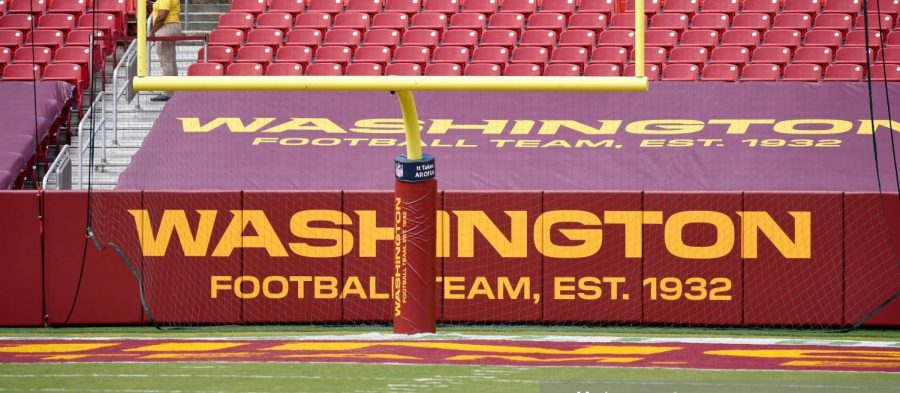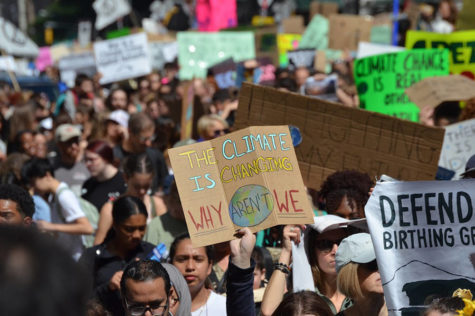Washington Football: A New Name for a New Era
Photo by Randy Litzinger/Icon Sportswire via Getty Images
December 14, 2020
The summer of 2020 was an exceedingly turbulent time in the United States: an ongoing global pandemic, a hazy political climate, the killing of countless Black Americans at the hands of police, and, as a result, a refreshed sense of social awareness that sparked petitions, protests, and cries for change. One institution that responded to the calls for progress away from the racism present in the United States was the Washington Football Team, announcing on July 13, 2020 that the franchise would be dropping the team’s former name after decades of controversy surrounding the term. The announcement came as a surprise to many dedicated fans who had simply become accustomed to the offensive nature of the team’s previous name. However, the name change came as a relief to Native Americans nationwide, as after years of fighting for a name change, the slur that served as a painful reminder of the violent history of atrocities committed against Indigenous people in the United States was finally removed from the National Football League. As explained by Ray Halbritter, the Representative of Oneida Nation who had long led the charge to change the Washington Football Team’s name with his Change the Mascot campaign, in an interview with the Washington Post soon after the announcement was made, “It closes a painful chapter of denigration and disrespect toward Native Americans and other people. This is about our children, about our future.”
The Washington Football Team, founded in 1932, is one of the oldest franchises in the National Football League, and with its age comes an extensive history of racism. The team was originally Boston-based, with the name Boston Braves, a term sometimes used to refer to Navtive American warriors, rendered derogatory by the misappropriation by the use of such a significant and sacred cultural tradition as branding for a team. In 1933, the team moved stadiums, and along with the change in stadium came a change in name, to the Washington Redsk*ns, which remained the team’s name until July of 2020. However, the Washington Football Team’s history of racism is not simply confined to its name: the team also has a long history of discrimination against African American players. George Perston Marshall, the team’s owner from its creation in 1932 until his death in 1969, as well as the man responsible for the team’s former name, led the charge on a ban of African American players in the National Football League from 1933 until 1946. Yet the reintegration of the National Football League in 1945 did not mean an end to the Washington Football Team’s segregation, as Marshall refused to hire an African American player onto the team until forced to do so by the Kennedy Administration in 1962, making the Washington Football Team the last in the nation to integrate.
Dating back to the colonial era of the Americas, the term “Redsk*n” has had a derogatory and violent connotation in regard to Native people. According to a report by the National Congress of American Indians, “The term originates from a time when Native people were actively hunted and killed for bounties, and their skins were used as proof of Indian kill. Bounties were issued by European companies, colonies, and some states, most notably California. By the turn of the 20th century it had evolved to become a term meant to disparage and denote inferiority and savagery in American culture. By 1932, the word had been a term of commodification and a commentary on the color of a body part.” However, as observed by a coalition of Native American organizations in a letter to the head of the NFL in 1972, with an influx of media depictions of the old American West in media during the mid to late 20th century, the term began to gain an even more denigrative tone, as Native people were often inaccurately depicted as villains or savages in pop culture. Beyond its offensive and derogatory nature, the use of a slur as a team name has had a tangible and malignant effect on Native people; a study performed by Dr. Stephanie Fryberg, a cultural and social psychology researcher and scholar who happens to be a member of the Tulalip Tribes in Washington state, in 2004 discovered that American Indian-themed names being used as the names, logos, and mascots of schools and sports teams has had a negative psychological impact on Native Americans while having positive psychological effects and raising the self esteem of on European Americans, a phenomenon which Fryberg concluded has contributed to negative race relations in the United States, such as how, according to the department of justice, “American Indians are more likely than people of other races to experience violence at the hands of someone of a different race.” Research has shown that the use of Native American names as sports mascots is detrimental to the self esteem and sense of identity of Native people, specifically youth. This lack of self confidence and identity has likely contributed to the alarming statistic that Native American youth having the highest rate of suicide among all American youth at 18 percent, which is more than double the percent of the next highest rate of youth suicide by racial group.
So why would a team select a slur with such an offensive and violent history as a name and mascot? When the Washington Football Team, originally named the Boston Braves after the baseball team with whom they shared a stadium, relocated to Fenway Park in 1932, the team changed its name under the charade of honoring Native peoples. George Preston Marshall, the then owner of the Washington Football Team, claimed that the name change, while also to avoid confusion with the baseball team of the same name, sought to honor the football team’s new coach William “Lonestar” Dietz, who claimed to be an American Indian. However, federal court proceedings as well as an FBI investigation later exposed Dietz’s claims of Native heritage to be completely fabricated and that he was, in actuality, German. Even after the truth about Dietz’s race was revealed, the Washington Football team maintained the claim that the slur was in honor of Dietz among other Native people and therefore not offensive in nature.
The racist offences of the Washington Football Team did not stop at having a racial slur for a name, as the team’s mascot was a cartoonish and inaccurate representation of a Native American man and the team’s fight song originally included highly offensive lyrics, such as the threat that the team would “scalp em [their opponents].”
Outrage over the Washington Football Team’s offensive former name and mascot was no new development, as Native people have pushed for decades in order to get the branding removed and instead replaced with something inoffensive that does not make a mockery of their culture. The first traction gained in the fight to change the team’s name occurred in 1972, when a group of D.C. reporters began advocating for a name change, gaining widespread media attention, as well as when the then president of the Washington Football Team, Edward Bennett Williams, met with a group of Native American leaders to discuss changing the team’s name. The team’s name remained the same after the meeting. Another significant effort to change the Washington Football Team’s name occurred by way of trademark lawsuit, as beginning in 1992, multiple lawsuits had been filed against the team for having a trademarked name that was disparaging to Native Americans. The patent and trademark office’s decision on the matter had initially gone in favor of the Native Americans but were overruled on the side of the Washington Football Team in federal appeals court in two separate instances. However, in 2017, the Supreme Court ruled that the Washington Football Team’s logo and name were constitutional under the first amendment and were therefore able to retain their trademark. In addition, innumerous petitions, protests, and general public outcries for the offensive name to be changed have occurred for decades, increasing in volume and support in recent years, but the Washington Football Team’s attitude toward a potential name could still be summed up by team owner Dan Snyder with his statement in a 2013 interview with USA Today: “We’ll never change the name. It’s that simple. NEVER—you can use caps.”
That is, until recently. On July 3rd, 2020, amid high racial tensions and a wave of cries for social change sweeping the nation, the Washington Football Team announced that they would be undergoing a “thorough review” of their current name. Only 10 days later, on July 13, the team announced that they would drop the racist moniker and instead refer to themselves as the Washington Football Team until a new name could be decided on. To many, the team’s new branding came as a welcome and overdue change from the team’s racially insensitive past, including David Glass, president of the National Coalition Against Racism In Sports and Media and member of the White Earth Band of Ojibwe, who told the Washington Post, “It’s sort of surreal after three decades and then poof.” Yet the long-awaited decision may not have been as conscientious as it appeared. In the summer of 2020, 87 investment firms and shareholders requested FedEx, Nike, and Pepsico, three of the Washington Football Team’s largest corporate sponsors, would threaten to sever financial ties with the team if they did not agree to change their name. On July 2 FedEx, whose name appears on the team’s stadium, publicly announced that they had requested that the team change its name. The Washington Post also reported that the company had also sent a letter to the Washington Football team stating that FedEx would remove their branding from the team’s stadium after the NFL’s 2020 season if the team did not change its name as the team’s racist name did not align with FedEx’s mission to create a more inclusive society. Nike soon followed suit, pulling all of the team’s branded merchandise from shelves in early July. After years of protests and petitions seeking the same end goal found no success, the change of name in response to the threat of pulled sponsorships demonstrated that perhaps the owner’s move was not motivated by calls for social change so much as the threat of a major financial loss.
There is currently no clear answer as to how the Washington Football Team will proceed in their search for a new name. The team has announced their intention to retain the branding of the Washington Football Team through the 2021 NFL season, yet has not issued any statement on how the search for a new name will occur or when one should be expected.







Carlyssa • Jan 26, 2021 at 1:45 pm
This article is very informative and interesting to read.